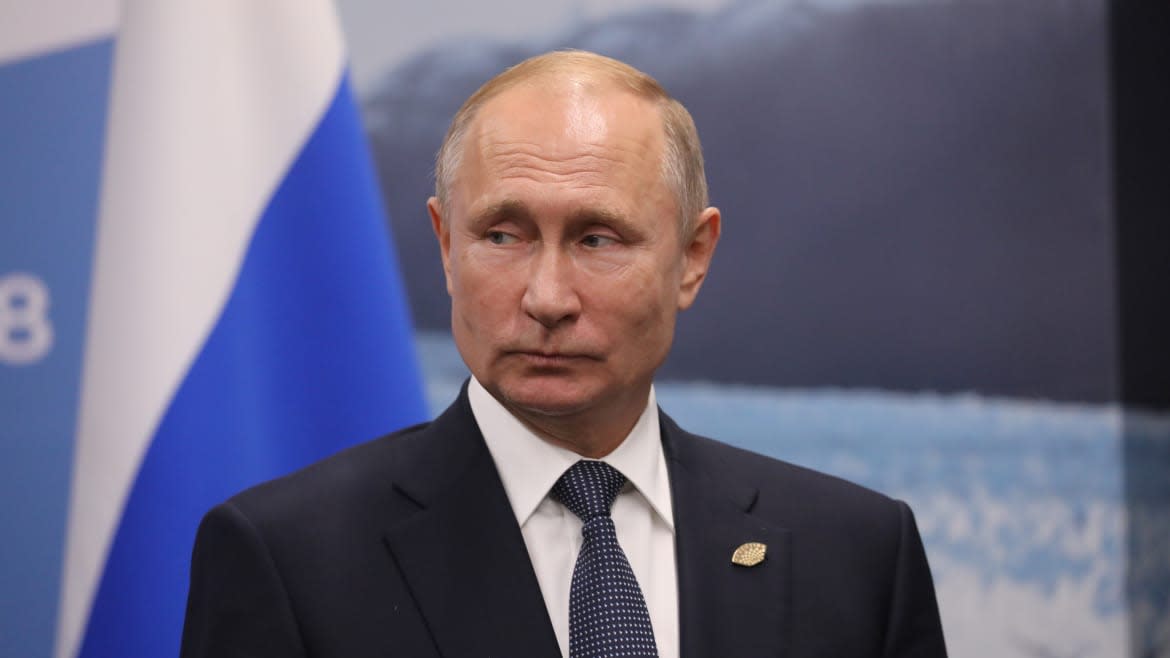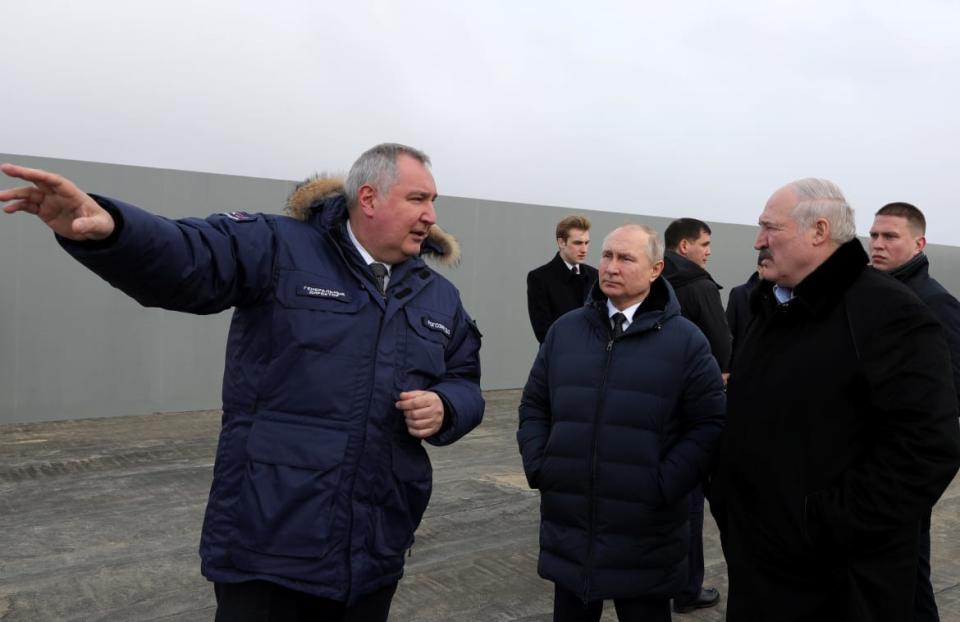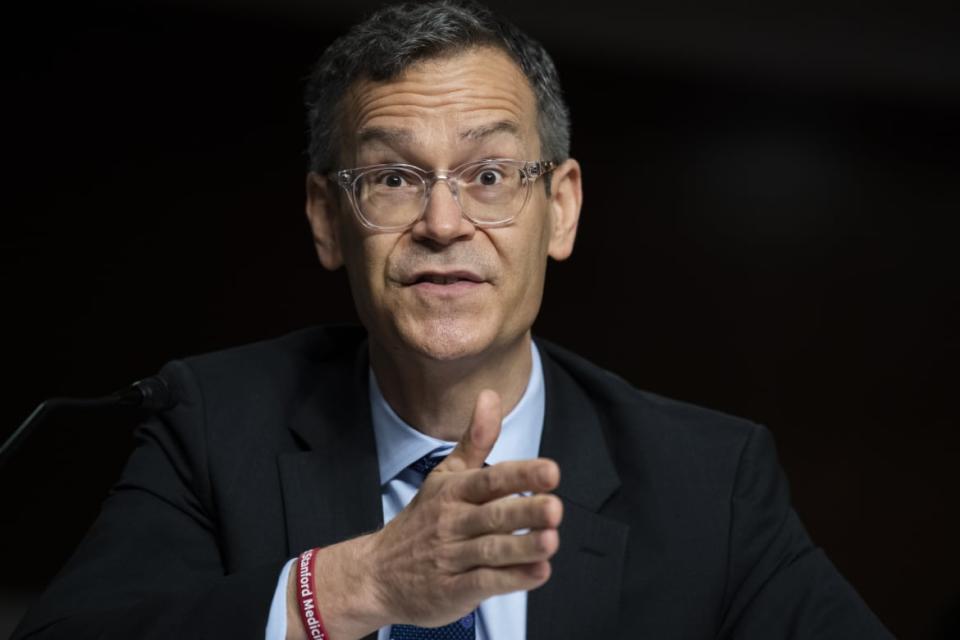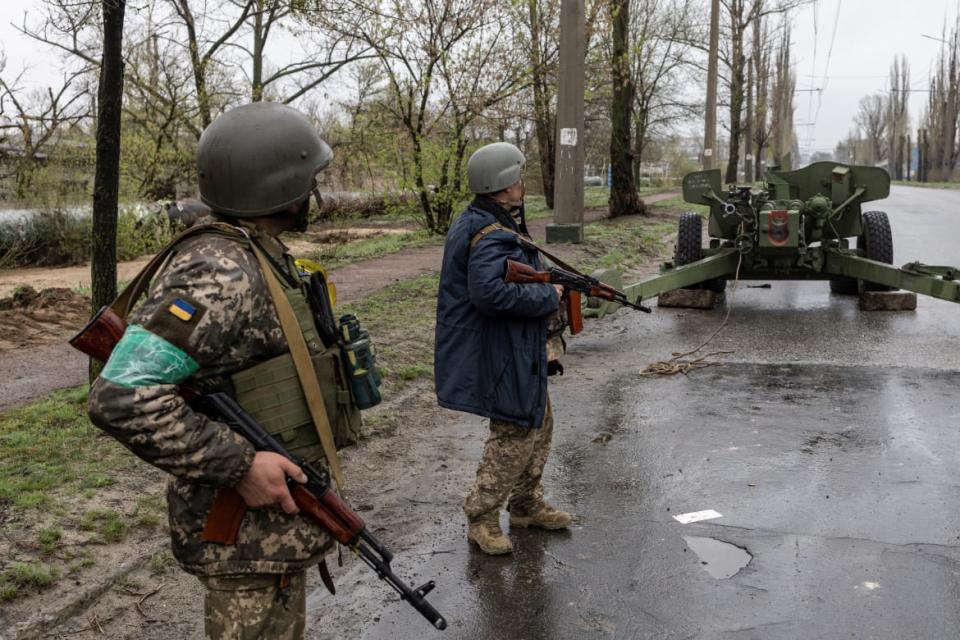Putin Still Wants Control of Whole of Ukraine, U.S. Ambassador Warns

- Oops!Something went wrong.Please try again later.
- Oops!Something went wrong.Please try again later.
While Russian forces have been focusing the fight on eastern Ukraine for weeks now, Russian President Vladimir Putin still has ambitions to take over all of Ukraine, the U.S. Ambassador to the Organization for Security and Cooperation in Europe (OSCE), told The Daily Beast in an exclusive interview Tuesday.
“Our assessment from the U.S. perspective is that Putin has not abandoned his plans to control Ukraine,” Michael Carpenter, the U.S. envoy, told The Daily Beast.
Putin’s forces originally launched an invasion into Ukraine this February with the goal of taking all of the country, including Kyiv. He even came up with a puppet regime he wanted to install in Kyiv and was very confident the plan was going to work, according to a brief from British intelligence.
But when the Russian military flailed outside of Kyiv for days, failing to solve logistical and maintenance problems, and ultimately failed to take control of Ukraine’s capital, Russia took a step back to reroute the military to eastern Ukraine in the Donbas. Since, Russian officials have revealed Moscow’s plans are to sweep portions of Ukraine into the Kremlin’s hands, and the U.S. Mission to the OSCE believes that the Kremlin maintains plans to annex or host a sham referendum in Kherson to envelope the city into Russia.
But looks can be deceiving, and while battles and sham referendum questions are focused on eastern Ukraine right now, Carpenter warned he doesn’t think Putin will stop there.
“While right now he is focused on the southeastern part of the country, I don’t think anyone can rest assured that Putin won’t move on other parts of Ukraine at some point in the future,” Carpenter said.
Carpenter’s effort to flash the warning signs for the war is not the only signal pointing to Putin’s alarming scheme.
Russian war plans that Ukrainian intelligence gathered in a city Russian forces abandoned last month indicate that Putin remains set on going after all of Ukraine, Ukraine’s State Bureau of Investigation said this May.
In a hint that Moscow is prepared to let the war drag on, other Putin cronies are weighing in, too. Russia’s space chief, Dmitry Rogozin, claimed Tuesday that Ukraine is an “existential threat” to Russia and that his country needs to put an end to them.
“If we do not put an end to them, as, unfortunately, our grandfathers did not do away with them, we will have to die, but end up at an even greater cost to our grandchildren,” he said. “So let’s get this over with. Once and forever.”

Russian President Vladimir Putin and Belarusian President Alexander Lukashenko listen to Roscosmos Director General Dmitry Rogozin as they visit the construction site of the Amur launch complex for Angara rockets at the Vostochny Cosmodrome in Amur Region, Russia.
Just this weekend Putin said his country should “take back” land he believes belongs to Russia, invoking Russia’s first emperor’s yearlong conquest that led Sweden to cede territory to Russia—comments that have sparked concerns that Putin is indeed prepared for an extremely long war.
“This war could go on for quite a long time,” Carpenter told The Daily Beast. “That is, again, why President Biden is committed to giving Ukraine the weapons and the materiel to be able to defend themselves.”
Under Secretary of Defense for Policy Colin Kahl echoed Carpenter’s concerns about Putin having grander ambitions to take all of Ukraine, while speaking at an event at the Center for New American Security Tuesday—but said he doesn’t think he can “achieve those objectives.”
Concerns have been mounting that Putin could be posturing to invade other countries beyond Ukraine if it falls, including the Baltic states—Estonia, Latvia, and Lithuania—as well as Poland.
Putin is likely to lean on Belarusian leader Alexander Lukashenko, a notorious Putin ally, in the coming stages, Carpenter warned. Lukashenko has announced in recent weeks that he is creating a new military unit on the border of Ukraine and has been preparing his military in the last several days to transition from peacetime to wartime.
And while Lukashenko in all likelihood doesn’t want to attack Ukraine given the domestic backlash he’d receive, Putin is likely pressuring Lukashenko, Carpenter said.
“Belarus has very limited sovereignty,” Carpenter told The Daily Beast. “A lot of the moves that Belarus makes are at Russia’s instigation.”

Colin Kahl, undersecretary of defense for policy.
Lukashenko has been “hesitant to get involved militarily with boots on the ground in Ukraine, although I’m sure there has been a great deal of pressure from Moscow to do just that.”
At a minimum, if Belarusian troops can keep Ukrainian resources dedicated in the north, it could free up Russian fighters to make more progress in Eastern Ukraine.
“It suits Russia’s military strategy to have Belarus threaten Ukraine,” Carpenter said. “From Russia's perspective, they would like to have some Ukrainian forces pinned down in the north to keep an eye on Belarusian troops so that Russia can continue to advance in the Donbas and in southeastern Ukraine.”
Lukashenko in recent days has suggested that Belarus might need to jump into the fray and fight for Western Ukraine—ostensibly so that western nations don’t “chop” it off.
“Maybe we will have to fight for Western Ukraine so that it is not chopped off,” Lukashenko said, according to Zerkalo.io.
Heavy fighting continued in Eastern Ukraine Tuesday. Top Russian military brass told Ukrainian troops to “surrender or die” in Severodonetsk, a holdout of Ukraine in Luhansk, and civilians are still holed up in the Azot chemical plant.

Ukrainian servicemen stand along a road in the town of Severodonetsk, Luhansk region, Ukraine.
To keep the support flowing to Ukraine, the Biden administration is prepared to announce its next aid package as soon as this week, according to NBC.
But, as the war reaches this drawn out stage, Americans’ willingness to put up with the repercussions of the war—inflation and higher gas prices—is tailing off. When asked in March, 65 percent of Americans were willing to withstand inflation as a result of the war and 73 percent were willing to withstand higher energy prices, according to a University of Maryland’s Critical Issues poll. By May, the polls dropped to 52 percent and 59 percent, respectively.
As the support wanes, the Biden administration is working to pressure allies to step up their contributions as Ukraine approaches a reconstruction phase so that the United States isn’t bearing the brunt of it all, Carpenter told The Daily Beast.
The United States has by far contributed more aid—militarily and otherwise—than other countries, according to a Kiel Institute for the World Economy analysis that tracked contributions through mid-May.
“There is concern as well, and there should be, rightfully so, about burden-sharing. And we certainly are trying very hard to get our allies and partners to step up,” Carpenter said. “Especially when it comes to the reconstruction, some of the countries that maybe haven't provided as much militarily, we will certainly look to them to also provide reconstruction assistance and macro financial assistance, and other forms of support.”
Get the Daily Beast's biggest scoops and scandals delivered right to your inbox. Sign up now.
Stay informed and gain unlimited access to the Daily Beast's unmatched reporting. Subscribe now.

